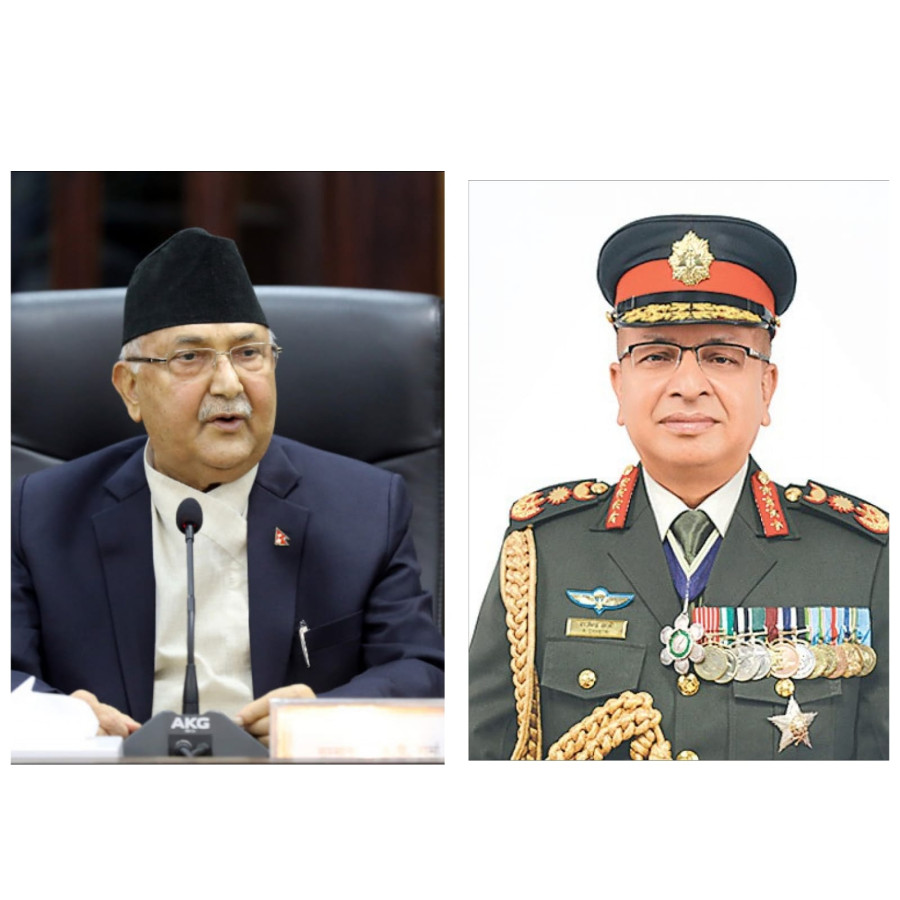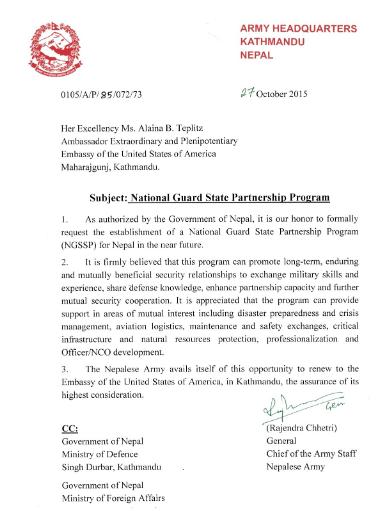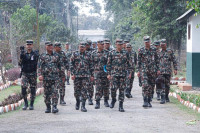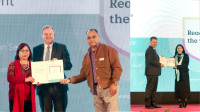National
Nepal Army letter shows Nepal applied for SPP in October 2015
UML’s bid to wash its hands of responsibility falls flat as its chair Oli was prime minister at that time. Letter leaked a day after the Army refuted claims that Nepal is part of the State Partnership Program.
Binod Ghimire & Tika R Pradhan
A day after the Nepal Army refuted claims that Nepal is part of the United States government’s State Partnership Program, a letter sent by the Nepal Army to the former US ambassador to Kathmandu has been leaked, in which it has requested the establishment of National Guard State Partnership Program for Nepal.
The copy of the letter obtained by the Post is dated October 27, 2015. The letter, undersigned by then Army chief Rajendra Chhetri, has been copied to the Defence Ministry of Nepal.
At that time, CPN-UML chair KP Sharma Oli was prime minister and defence minister.
“As authorised by the government of Nepal, it is our honour to formally request the establishment of the National Guard State Partnership Program for Nepal,” reads the letter addressed to Alaina B Teplitz, then US ambassador to Nepal.“It is firmly believed that this program can promote long-term, enduring and mutually beneficial security relationships to exchange military skills and experience, share defence knowledge, enhance partnership capacity and further mutual security cooperation.”
The Nepal Army confirmed to the Post about the letter.
“The letter is official. It was written in the aftermath of the 2015 earthquake seeking logistic and training support to cope up with disaster,” said Brigadier General Narayan Silwal, spokesperson for the Nepal Army in a brief interview. “The letter mentions the State Partnership Program because such support is provided only by the US National Guard and not by its National Army.”
On Wednesday’s statement that said the Nepal Army has not signed any agreement, Silwal said: “We stand by the statement as there has been no agreement on SPP. Nor will there be any in the future.”
The SPP, however, has become a politically charged issue in Nepal.
Over the last few days, UML lawmakers have been demanding that Prime Minister Sher Bahadur Deuba offer clarifications in Parliament regarding Nepal’s plan to join the SPP.
“Participating in such a military alliance will push Nepal into geopolitical conflict,” Pradeep Gyawali, a senior UML leader and former foreign minister, said in Parliament on Wednesday. “The prime minister must clarify before the Parliament.”
After some sections of the Nepali media published a document calling it a draft agreement between the Nepal Army and the Utah National Guard of the United States, the US embassy in Kathmandu called it ‘fake’.
“The document published by some online outlets purporting to be a military deal between the United States and Nepal is fake,” said the embassy on Tuesday. “By policy, the United States does not ask countries to join the State Partnership Program and only responds to requests for consideration.”
On Wednesday, the embassy said the United States accepted Nepal in the SPP in 2019 after two requests in 2015 and 2017.
On Thursday morning, CPN (Maoist Centre) chair Pushpa Kamal Dahal said that Nepal agreed to the SPP when Oli was the prime minister in 2019. At that time, Dahal, along with Oli, was co-chair of a party called Nepal Communist Party, which was formed after a merger between the UML and the Maoist Centre.
While speaking at Parliament on Thursday afternoon, UML senior vice chair Ishwor Pokhrel alleged that Nepali Congress leaders had initially given a positive response to the US about the SPP and now they are shifting the blame on the UML after the issue ran into controversy.
He claimed that [the late] Sushil Koirala and Deuba governments in 2015 and 2017, respectively, had positively responded to the US about the SPP.
“Firstly in 2015 and then in 2017, an official proposal was sent from Nepal. Who was leading the government then? Who was the prime minister then? What does the party that had the prime minister and defence minister of this country have to say?” he said. “In 2015, Sushil Koirala was the prime minister and defence minister. In 2017, Deuba was the prime minister. Who was leading the defence minister? Deuba knows very well.”
Pokhrel’s claim, however, fell flat after the Army letter got leaked.

Months after Nepal ratified Millenium Challenge Corporation, which had left Nepali polity and society divided, SPP has emerged as yet another controversial topic, dividing political and intellectual circles yet again.
Chhetri, the former Army chief who wrote the letter to the US in 2015, told the Post on Tuesday that the SPP is a bilateral agreement which addresses the humanitarian assistance and disaster relief, counter-terrorism, peacekeeping operations, joint military training either in Nepal or in the US.
“But it is not targeted against any third country,” he said.
Chhetri, who is currently in the US, said that he has not seen any [new] draft related to the SPP but he believes that there are no any problematic clauses.
“There are 90 plus countries that are part of the SPP and many of them are active members of the Non-aligned Movement,” he said.
The 2015 Army letter has come into the public domain a day after Law Minister Govinda Sharma Bandi called talks about Nepal joining the SSP are just rumours aimed at defaming the government.
On Thursday, Home Minister Bal Krishna Khand said that Nepal is not part of the SPP and does not intend to join it. He was responding to lawmakers on behalf of Deuba, who is also the defence minister.
“I want to make it clear that Nepal is not involved in the SPP and has no intention to be part of it,” said Khand. “I would like to express this commitment on behalf of the government.”
Stating that Nepal follows Panchsheel and non-alignment policy, Khand said Nepal will never become part of any military alliance.
Despite calls from lawmakers, Deuba has not responded in Parliament. He skipped Thursday’s Parliament meeting.
On Wednesday, Deuba told his coalition partners that Nepal won’t sign any agreement [with any country] that could bring harm to Nepal.
Meanwhile, the US embassy in Kathmandu came up with further clarification on the SPP, saying that there continuously has been open dialogue with Nepali leaders to collaborate.
“Since the US agreed to Nepal’s request to take part in the State Partnership Program, we have continued to have open dialogue with Nepali leaders to collaborate on what the cooperative exchanges under SPP might look like, to include possible humanitarian assistance and disaster relief preparedness activities,” the embassy said. “No SPP-led events have occurred because Nepal has not wanted them to occur. Any events under SPP would happen only with the approval of Nepal.”
The embassy statement insinuates that Nepali leadership was well aware of Nepal’s participation in the SPP.
The Nepal Army also told the Post that the letter was written with the consent of the government.
“The partnership is a regular military-to-military exchange programme occurring between the National Guard and Nepali Army,” the embassy said.
“When Nepal asked to participate in the programme in 2015, and again in 2017, the request involved civilian, government, and military leaders from Nepal, openly looking to take advantage of a program focused on security cooperation and exchanges, and humanitarian assistance and disaster readiness.”
The embassy also made it clear that Nepal can stop its participation in the SPP if it wishes so.
“A country can simply inform the United States that they no longer wish to participate in the program,” said the embassy. “Out of nearly 90 countries with the State Partnership Program, only Belarus has ended its participation in the program.”




 16.96°C Kathmandu
16.96°C Kathmandu















